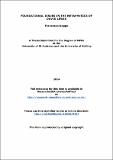Files in this item
Foundational issues in the metaphysics of David Lewis
Item metadata
| dc.contributor.advisor | Hawley, Katherine (Katherine Jane) | |
| dc.contributor.advisor | Cotnoir, A. J. | |
| dc.contributor.author | Nappo, Francesco | |
| dc.coverage.spatial | [3], 122 p. | en_US |
| dc.date.accessioned | 2016-09-08T08:58:56Z | |
| dc.date.available | 2016-09-08T08:58:56Z | |
| dc.date.issued | 2014 | |
| dc.identifier.uri | https://hdl.handle.net/10023/9454 | |
| dc.description.abstract | Few contributions in the field of metaphysics can be compared, for their depth and impact, to the work of the American philosopher David K. Lewis. A feature of this work, which partly explain its great appeal, is its systematicity. Lewis’s views on intrinsicality, naturalness, supervenience, mind and modality, to mention just a few themes, constitute a unified and connected body of doctrines. As Lewis himself acknowledged in the introduction to the first volume of collected papers: “I should have liked to be a piecemeal, unsystematic philosopher, offering independent proposals on a variety of topics. It was not to be” (Lewis 1983, p. XI). Surely there is an element of beauty in this systematicity. But there is also an element of precariousness. For a body of doctrines has some vital organs: claims or assumptions that are so central to the life of the system that, if one were to reject them, the system as a whole would likely collapse. This seems to be true, in particular, of Lewis’s metaphysical system. What I present here are two investigations concerning, respectively, the problem of ontic vagueness and the existence of a fundamental level. I believe that the evaluation of these two issues is of vital importance for assessing the tenability of Lewis’s systematic metaphysics. There is a general worry lurking behind my discussion, which it’s worth making explicit here. The worry is that, if the justification for Lewis’s claims on ontic vagueness and fundamentality turned out to be wanting or otherwise unsatisfactory, and if I am right to think that these theses are part of a number of central claims constituting the basis of his metaphysical system, then it seems we should start being suspicious of the very tenability of the Lewisian metaphysics as a whole. What I will be arguing for in the two main chapters of this dissertation provides, in my view, enough material for a modest defense of Lewis’s views on ontic vagueness and fundamentality. I will clarify the content of this modest defense, and explain its significance for the development of the contemporary debate in metaphysics, as well as for a redefinition of a kind of Lewisian metaphysics, in a brief note at the end of the introduction. | en_US |
| dc.language.iso | en | en_US |
| dc.publisher | University of St Andrews | |
| dc.subject.lcc | B945.L4554N2 | |
| dc.subject.lcsh | Lewis, David K., 1941- | |
| dc.subject.lcsh | Vagueness (Philosophy) | en_US |
| dc.subject.lcsh | Absolute, The | en_US |
| dc.title | Foundational issues in the metaphysics of David Lewis | en_US |
| dc.type | Thesis | en_US |
| dc.type.qualificationlevel | Doctoral | en_US |
| dc.type.qualificationname | MPhil Master of Philosophy | en_US |
| dc.publisher.institution | The University of St Andrews | en_US |
| dc.publisher.department | University of Stirling | en_US |
This item appears in the following Collection(s)
Items in the St Andrews Research Repository are protected by copyright, with all rights reserved, unless otherwise indicated.

